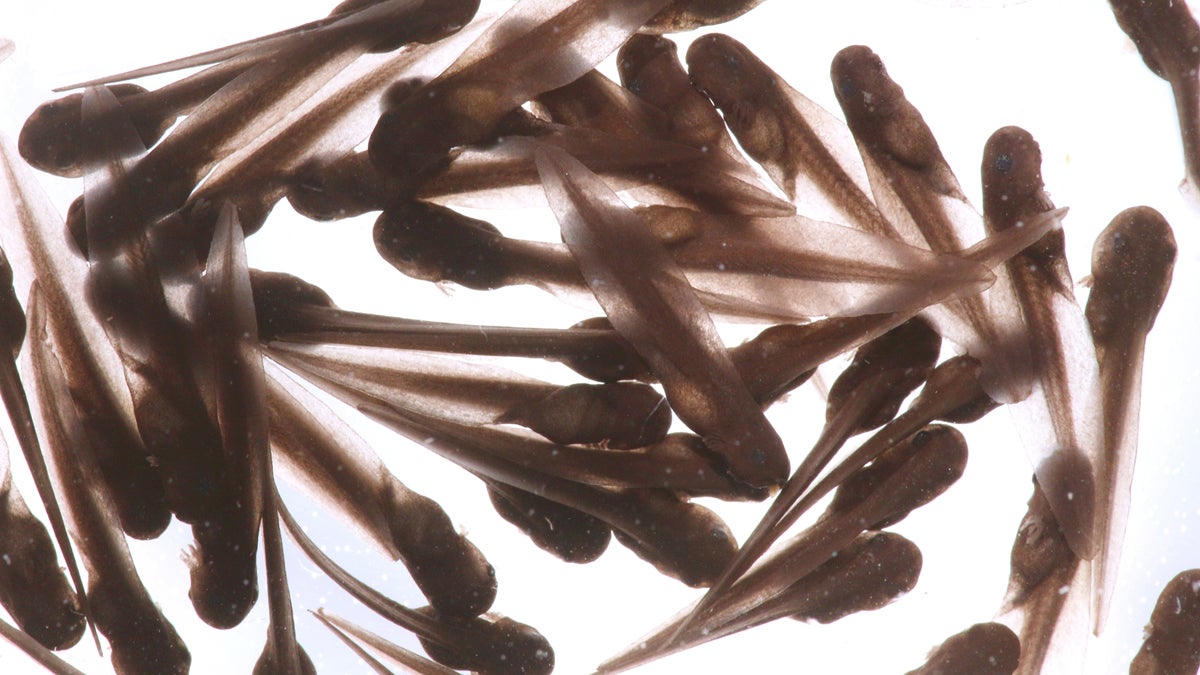Kids thrive when they swim among peers and mentors with common interests

Tadpoles (Steve Byland/Big Stock Photo)
Learning heroes can come from a wide range of settings in young people’s lives. One unexpectedly appeared in my son’s life when he was 8 years old.
My son had gone on a hike with my husband to a canyon in Malibu, and there they discovered a pond full of tadpoles. After emptying out their Thermos, they scooped up the tadpoles and brought them home, much to my chagrin. Dad assured me that they would go right away to the aquarium shop to get the supplies they needed to raise the tadpoles into frogs.
Many hours later they returned, with a special aquarium with a screen, gravel rocks, and everything the critters could possibly need in their journey to becoming frogs. My son was beaming. I thought it was because of all the stuff he had just scored, but it was actually due to someone he met at the aquarium shop — the “aquarium shop guy.” The aquarium shop guy had shared how he had walked that same canyon as a boy and discovered tadpoles, and had done research on how to raise the tadpoles into frogs. It was one of the experiences that launched him on his lifelong passion and his eventual vocation.
For about a year after his encounter with the aquarium shop guy, when my son was asked the ubiquitous question “What do you want to be when you grow up?” he would scratch his little head and ponder. Perhaps he would like to make video games, or design robots, or … “I know! I could be an aquarium shop guy!”
Network effects
My visit in March to Drexel University’s ExCITe Center and the Academy of Natural Sciences, to speak about some of my work with the Connected Learning Research Network and Connected Learning Lab, was an opportunity to reflect on this idea of the “learning hero,” a strong theme in our ongoing research.
The aquarium shop guy is what we call an “affinity-based mentor” — someone who infects a young person with a passion for knowledge in an area of shared interest. These mentors and learning heroes can have a transformative effect on young people’s lives, because they not only share knowledge, but also help them develop interests and find their place in the world.
Underlying the connected-learning model is the observation that young learners thrive when they pursue projects meaningful to them with peers who have shared interests, and when they are supported by caring adults — mentors, teachers, parents, and experts. The “connected” in connected learning refers to these social relationships, as well as the role online networks can play. For the past decade, I have been investigating these socially connected dimensions of learning with a interdisciplinary team of researchers.
Often education is conceived of as a “pipeline,” where we push kids along a set path from kindergarten, to elementary, high school, and so on. But when we talk to young people and really look at where and how they learn, and who they learn with, it looks more like a network.
We can all be learning heroes
Several people who attended my talk wrote reflections on their learning heroes, which NewsWorks published. Andrea Forte wrote, “I am network effect.” She describes the many people in her life who influenced her, beginning with her mother, who introduced her to programming; her biology teacher, who made science fun; and her Ph.D. advisor.
When people mention a teacher as learning hero, they often describe a shared personal passion. Matthew Lee describes how a teacher who ran his science club invited him to out-of-school activities including a design competition and conferences. And Chris Lehman describes how his English teacher, who sponsored the Pennsbury TV Sports program, helped him knit together in-school and out-of-school interests and activities to make English come to life.
Educators are important learning heroes, but there are also many other settings and people who support a young person’s success. Betty Chandy describes how her husband was both a role model and an encouragement for her to pursue her graduate degree. Alina Wheeler mentions an inspiring leader in her field, Keith Yamashita.
The bad news about connected learning is that there is no one program, organization, or technology that offers the silver bullet. And too often, young people don’t have access to a rich web of learning heroes that they need to find their place in the world. But the good news is that all of us can be learning heroes, whether we are a teacher, a parent, or a friend, or we have some knowledge to share. Whether it is sharing your passion with a young learner, or thanking one of your learning heroes, we all have a role to play.
—
Mimi Ito is a cultural anthropologist of technology use, examining young people’s changing relationships to media and communications. She is Professor in Residence and John D. and Catherine T. MacArthur Foundation Chair in Digital Media and Learning at the University of California, Irvine. She chairs the MacArthur Connected Learning Research Network and is Research Director of the Digital Media and Learning Hub. She is co-founder of Connected Camps, a benefit corporation that provides online creative learning in Minecraft for kids in all walks of life.
To learn more about the work that the Connected Learning Research Network is doing on affinity-based mentorship, check out the Digital Youth Network, the Youth Initiated Mentorship model from the National Mentoring Resource Center, and Connected Camps online mentoring for in coding and Minecraft.
WHYY is your source for fact-based, in-depth journalism and information. As a nonprofit organization, we rely on financial support from readers like you. Please give today.

